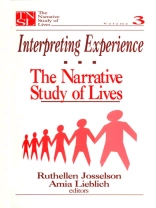How does context shape biography? How do language and relationships affect the development of people′s work lives? An international group of scholars from diverse disciplines addresses these and other issues in this volume of The Narrative Study of Lives. They explore what it means to take narrative seriously and how an empathic stance in narrative research opens out on the dialogic self. The contributors also consider questions of how participants make meaning out of their experience in the framework of available interpretive horizons. In addition, there are sections that use narrative approaches to develop a deeper understanding of loneliness and the ‘coming out’ process in homosexuality. This volume examines the many ways in which people interpret their experience and explores conceptual avenues to make use of these understandings in the analysis of human life. Those interested in qualitative methods, evaluation, and education research will find Interpreting Experience to be an invaluable contribution.
Daftar Isi
Introduction – Ruthellen Josselson and Amia Lieblich
Taking Narrative Seriously – Susan E Chase
Consequences for Methods and Theory in Interview Studies
Imagining the Real – Ruthellen Josselson
Empathy, Narrative and the Architectonics of the Self
Biographical Work and New Ethnography – Jaber F Gubrium and James A Holstein
Life History and Academic Work – Steven Weiland
The Career of Professor G
Developmental Patterns of Mathematically Gifted Individuals as Viewed through Their Narratives – Ada Zohar
The Quest for Connectedness – Hadas Wiseman
Loneliness as Process in Narratives of Lonely University Students
It′s the Telling that Makes the Difference – Adital Tirosh-Ben-Ari
Life Histories as Social Texts of Personal Experience in Sociolinguistic Studies – Sarah Mkhonza
A Look at the Lives of Domestic Workers in Swaziland
Extending Boundaries – Ardra L Cole and J Gary Knowles
Narrative on Exchange












